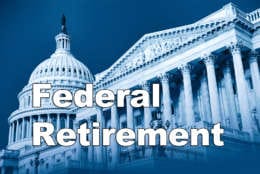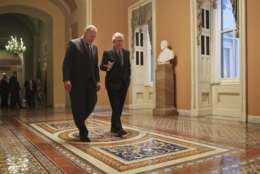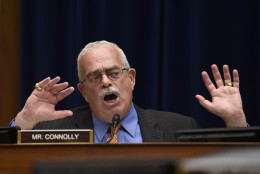National Active and Retired Federal Employees Association
-
Federal retirees in 1980 could establish a standard of living and keep it even during 14 percent inflation and 11-plus percent the following year. Now, the Trump administration has submitted a legislative package that would, among other things, eliminate cost of living adjustments for current and future workers retiring under the Federal Employees Retirement System.
June 06, 2018 -
Federal News Radio explains each of OPM's proposed changes to the federal retirement system and details their outlook in Congress.
May 15, 2018 -
The White House has revived old proposals to make feds pay more for, and get less from, their retirement package while also eliminating a gap payment for workers who retire before age 62, even if they are required to do so.
May 08, 2018 -
NARFE president Richard Thissen and Federal News Radio reporter Nicole Ogrysko join host Mike Causey on this week's Your Turn to discuss proposed changes to the federal retirement system and the odds that any of them will become law this year. May 9, 2018
May 08, 2018 -
The Office of Personnel Management detailed several significant proposals that would impact the current federal employee retirement system.
May 07, 2018 -
The two primary unions representing postal workers support a bipartisan postal reform bill in March, while the National Active and Retired Federal Employees opposes it for fear it will force retirees to take Medicare Part B.
April 24, 2018 -
Threats to reform federal retirement systems are back, but in an election year, time appears to be on the side of workers and retirees with most members are anxious to be out of Washington.
April 11, 2018 -
Union leaders differ on the new Postal Service Reform Act introduced in the Senate, which is meant to make the USPS more financially stable but could have ramifications for employees' health care.
March 30, 2018 -
President Donald Trump's fiscal 2019 budget request includes several other recommendations that would change current retirement, health and other benefits for federal employees.
February 12, 2018 -
Unlike previous two-year, bipartisan budget agreements, the Senate's latest deal does not use higher federal employee retirement contributions as an offset to a $300 billion spending boost over 2018 and 2019.
February 08, 2018 -
For the first time, federal retirees were supposed to be able to donate to the Combined Federal Campaign this year. But the Office of Personnel Management is still waiting for final clearance to solicit donations from retirees, and it can't accept annuitants' contributions online.
November 22, 2017 -
The House will likely pass a budget resolution that would reform civil service pensions to reduce the federal deficit by $32 billion over 10 years.
October 04, 2017 -
President Donald Trump authorized a pay raise for civilian and military employees beginning Jan. 1, 2018.
August 31, 2017 -
Federal taxes take a good bite out of everyone's paycheck. But it's the same no matter where you live. State taxes are another matter.
August 24, 2017 -
Proposed changes to the federal retirement system could force current federal employees to delay retirements and spark financial hardship for current retirees. Federal financial experts discuss these proposals, which President Donald Trump included in his full fiscal 2018 budget request.
May 23, 2017















